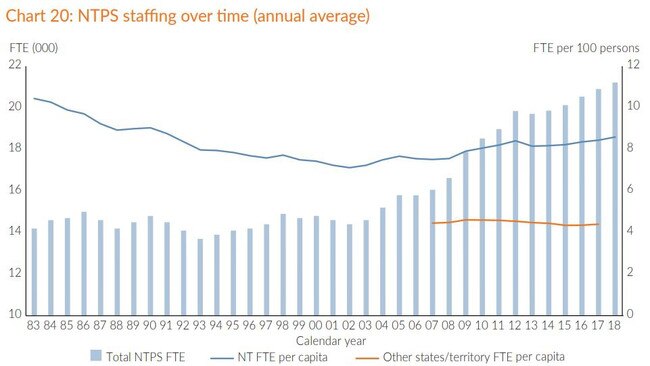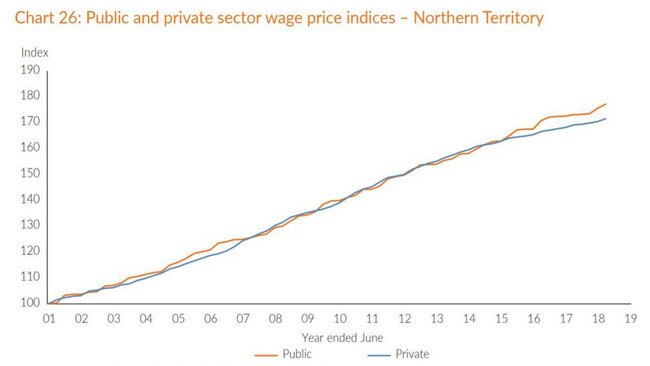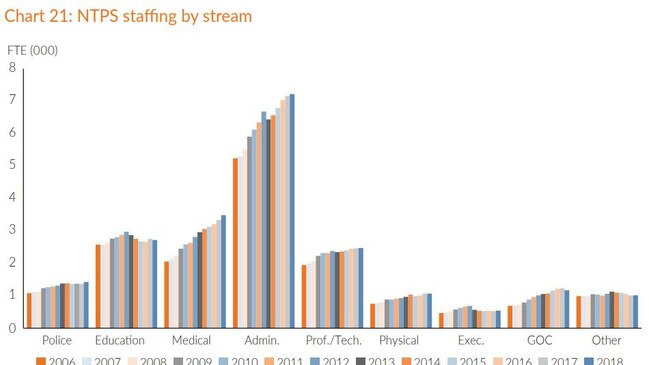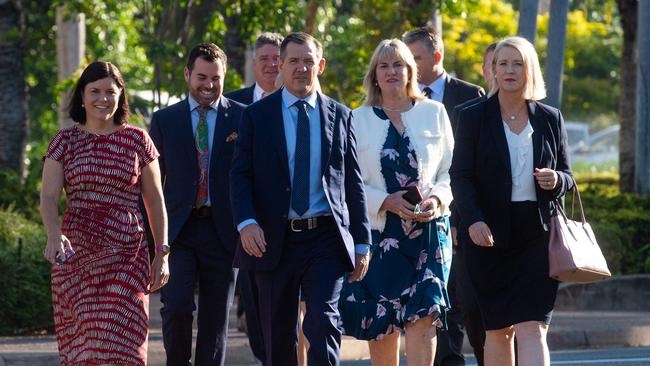THE Territory government has scrapped its commitment to budget repair.
That’s the only conclusion that can be drawn after the release of the Commissioner for Public Employment’s State of the Service report that has been tabled in parliament.
Through that report we learned the size of the NT Public Service has grown again.
This was despite promises of freezes and caps that have proven about as effective as a thumb in the wall of a dyke.
There are now 21,836 full-time equivalent public servants in the Northern Territory.
The latest rise comes after former Treasurer Nicole Manison announced the number would be capped at 21,395 by March.
RELATED MATT CUNNINGHAM OPINIONS
The Territory has a problem. Its public service is officially out of control
We can’t delay long overdue public service cuts any longer
There’s no fixing the financial mess the NT is in without genuine public service reform
NT politics now just a bidding war for votes of well-off public servants
This cap had been increased from an earlier cap of 21,118 that the government had failed to achieve.
The caps were introduced after hiring freezes failed to halt the growth in numbers.
This continuing rise in NTPS employees means the budget will never return to surplus.
In the government’s own report into budget repair, chair John Langoulant wrote: “A prerequisite to returning the budget to balance will be to stop employment growth across the NTPS.
“This is particularly important in the next three years, given that any changes in the wages policy will have limited practical effect until 2021-22 due to the time frames of current enterprise agreements.”
Those words were written 18 months ago.
Since then we’ve not only seen the opportunity to cap NTPS numbers missed, we’ve seen those numbers grow.



Langoulant noted in March 2019 that if measures to restrain the cost of the NTPS could not be implemented “a reduction of staff levels will be necessary”.
This is absolutely correct from a budget standpoint.
But as we learned at August’s election, political considerations mean these reductions will never occur.
A Northern Territory politician who pledges to reduce the size of the public service is one who no longer wants to be in parliament.
That’s why we saw both major parties promise not to go near this issue during the campaign.

From Cullen Bay to Casuarina, promising not to address this elephant in the room has delivered Labor electoral dominance in the northern suburbs.
The CLP has since made the same promises, but this massive chunk of the voting bloc is still spooked by the small measures the party took to tackle the issue back in 2012.
As a result, the public service grows. So too does the debt, and there is no way of reining it in. The 21,836 full-time equivalent employees will be the lowest we see that number during this term of government.
This might be defensible if we were employing necessary frontline workers. But the balance in the NTPS is badly out of whack.
MORE MATT CUNNINGHAM OPINIONS
Social media ‘news’ is being delivered to you at the expense of scrutiny and truth
If you don’t pay for news, you’ll be left with the ABC
Fear allowing politicians to make decisions that wouldn’t normally pass the pub test
Time for our politicians to get on with governing instead of chasing power
NT Govt’s new ‘how can we help you?’ attitude needs to be a permanent change
In education, for example, there are 4386 employees.
But – according to 2018 figures in the Langoulant report – there were just 2674 teachers.
The latest increase will be blamed on the coronavirus and the budget blowouts on the fall in GST.
But it was the GST windfall that began at the turn of the century that started this problem. Langoulant notes that the size of the public service was relatively static until the early 2000s.
But the introduction of the GST – and the extra commonwealth revenue that came with it – saw the numbers rise quickly.
In the last two years they have continued to climb, even though our population has been falling.
MORE MATT CUNNINGHAM OPINIONS
Northern Territory needs to develop a more sensible energy policy
Palmerston Hospital stands as a triumph of politics over sensible policy
Government’s reliance on spin doctors shows contempt for its constituents
Royal Commission left the Gunner Government an impossible mission
That GST revenue is sent here at a rate far higher than anywhere else in the country because of our high levels of Indigenous disadvantage.
Yet the increases to public service numbers since 2001 – from about 14,000 to almost 22,000 – has done noting to improve the lives of people in remote Aboriginal communities.
In the past two months we’ve seen coronial inquests into the tragic deaths of six teenagers by suicide and volatile substance abuse.
Over the past 12 months, the NT Education Department added 90 extra staff.
Yet the latest annual report showed Indigenous attendance rates have not improved in five years, with just 32 per cent of Aboriginal kids attending school more than four days a week.
We seem incapable of learning that more doesn’t necessarily mean better.
OFFER EXTENDED: Amazing NT News subscription offer: Read everything for $1
The coronavirus might have given the government a free pass on budget reform in the short term, but our day of reckoning is still coming.

Add your comment to this story
To join the conversation, please log in. Don't have an account? Register
Join the conversation, you are commenting as Logout
The Stem Academy helping young Indigenous women beat the odds
In the NT, the percentage of Indigenous students who stay in school is the lowest in Australia at 33 per cent but the Young Indigenous Women’s Stem Academy is changing that.
Hockey NT launches Northern Gateway Initiative master plan
Fuelled by its exclusion from the Australian competition, Hockey NT has officially launched a four-year master plan to safeguard and grow the code. Here’s what you need to know.